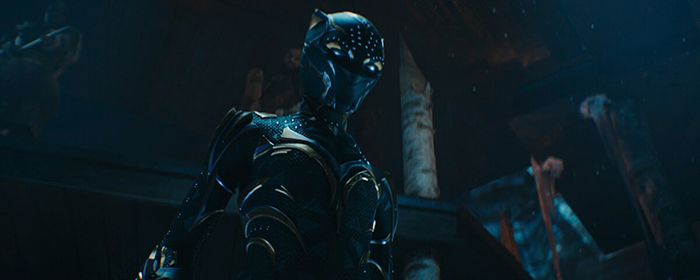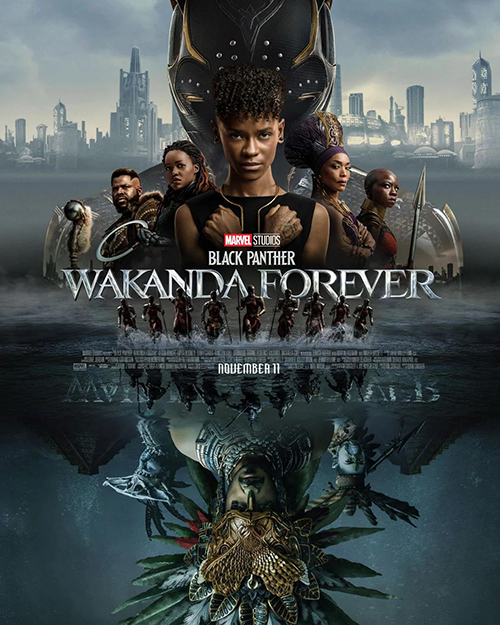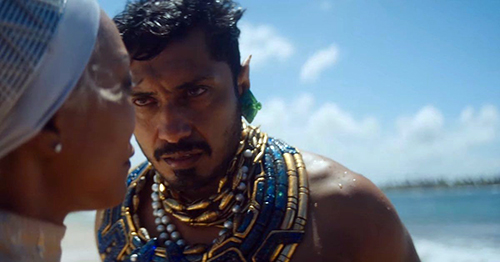Movies /
Comics Movie Reviews
Black Panther: Wakanda Forever

By Hervé St-Louis
November 12, 2022 - 15:01
Following the death of T’Challa, the Black Panther and ruler of the African nation of Wakanda, the world wants the small country to share its vibranium. When that will not happen, an American team turns to the bottom of the Atlantic Ocean to find vibranium, igniting the fury of the aquatic people of Talokan. Their ruler, Namor, wants to force Wakanda to ally with him against the rest of the world, or else. Will Namor destroy Wakanda, or will a new Black Panther rise up to defend the African kingdom?
First, if you are the type of movie viewer who dislikes diversity and strong female leads, this film is not for you. Do not continue to read my review, as you will not find pleasure with it if your set of minds is that there is too much representation in Hollywood to the detriment of white men. This movie is not for you. Save us all the anguish and the arguments. Skip my review, skip the film too. I don’t want to read about your trivial complaints. This movie is exactly what you dread so off you go.
For those of you that are left, let’s dig further as this movie does one thing important which I alluded to when I reviewed the
first Black Panther film almost five years ago. Its highlights how the fictional world of Wakanda already exists in the form of Haiti, a failed state. It has been my thesis for years for people who perceive Wakanda as a fictional symbol of black resistance to white colonialism. The kingdom of Wakanda is much like its titular superhero, Black Panther. Superheroes are larger than life and give people a fantasy that redress injustices in a wish-granting manner.
With superheroes, the victim finds a protector that it may not find in real life. There is someone to make things right which is not the case in our day-to-day affairs. Black Panther serves that role as the strong black superhero that fulfills the wishes for many of a strong independent individual, almost perfect that can then become a symbol and often, a role model. This way of seeing the superhero is not the only one, but it is prevalent in the genre. Some would say, it is an extension of the idea of a god that magically intervenes in human affairs to make things right or wrong.
Wakanda serves this purpose too. In the comics and the original Black Panther film, Wakanda was this greater than life African nation where blacks were free and a beacon of hope for the rest of the world, especially other black people. Wakanda was clean, civilized, and above all, had technology and science that surpassed anything possible in the world. Wakanda served as a “what if there was such an African nation in the world.”
In my original essay, I argued that there was such a nation, but it is not imbued with super heroics, just the ideals of a free country built by blacks in defiance of whites. Haiti is that nation, but it is a failed state, filled with turmoil, created over 200 years ago by enslaved blacks that had enough of whites. Haiti, more than the French that inspired them believed in liberty, fraternity, and equality. They helped much of Latin America and the United States, to break away from the European rule, to which many are still indebted. Haiti was that hope that many have tried to squash for 200 years, because of the power it represented.
Haiti was subversive then and is still today. A black nation of slaves that rebelled and created their own republic without slavery, after having expelled the greatest military force at the time, from an island where most indigenous people had been exterminated, centuries prior. The enslaved black people took this land which was not theirs. They made this rich land their own and expelled the French colonizers. Today, Haiti is in the dump, because of overt opposition from France and the United States for much of its history but the Haitian people always kept their resolve to have their own culture and their own land, much like the people of Wakanda.
And much like the people of Wakanda, the core strength of the Haitian people are women. They rise when the men die and do the dirty work that has to be done. In
Black Panther Wakanda Forever, we are reminded that Queen Ramonda is still the ruler of Wakanda, and while not queen by blood, she is queen by merit. When France, like it did with Haiti, tried to take its riches, it was women that guarded against enemy attacks. Okoye’s Dora Milaje, the all-women special force of Wakanda plays an important role in this unique movie where several black women fought as heroines.
France’s complaint about Wakandan power and might is exactly what France did to Haiti, when in 1825, years after Haitian independence had been enacted, it demanded 150-million-franc indemnity for the former French slave owners under threat of invasion and war. In Wakanda Forever, it was the super heroic Dora Milaje that stopped the French from acquiring Wakandan technology and science in Mali. There were no military might to keep France at bay in 1825, as it exacted its racist and colonial demands upon Haitians. As in 1825, the United States, In Wakanda Forever, looked passively as the French tried one of their usual tricks against black people.
Wakanda Forever is important as it captures the history of Haiti allegorically, showing what would happen to a black nation that dared not heed colonizers. If I were French today, I would press my government to repay the estimated 122 billion dollars taken from Haiti. Other symbols that tied Wakanda to Haiti, include the ever-present theme of drowning and calamity as seen by Namor’s attack on Wakanda, where he filled the throne room with water, in his attempt to kill Queen Ramonda. Many enslaved blacks chose drowning to servitude while being forced to cross the Atlantic Ocean during the slave trade.
When he first meets Queen Ramonda and Princess Shuri, Namor gives them a conch so that they can contact him. The conch is a symbol of Namor in comics. He uses it to call out gigantic sea creatures with which he can devastate the surface world. But the conch has another meaning in Haitian culture. It is both a popular food item, and a heraldic symbol of Haitian freedom. Surface dwellers use conchs to call sea creatures, or nymphs, mermaids, and mermen.
These sea spirits are sometimes friends, sometimes enemies. They are a mainstay of Haiti and have roots in the Arawak pre-colonial culture, but also Yoruba-based river spirits, and the voodoo religion practised in Haiti. I don’t know if this connection with merpeople, Haiti, and Wakanda was intentional for director Ryan Coogler. Wakanda and Talokan, Atlantis in Marvel Comics, have had many ties in comics since the 2000s.
Other hints of the melding of Haitian culture into Wakanda Forever include the address number of Nakia's home in Cap Haitian. The door’s number is 1804, Haiti’s date of independence. Then there is new Wakandan character named Toussaint, much like Haiti’s Toussaint Louverture, the father of Haitian independence. For Haitians, Toussaint is a historical figure the likes of what George Washington is for Americans.
While the first Black Panther movie celebrated African heritage, Wakanda Forever celebrated Meso-American and Caribbean culture with its mix of Mayan, Mexican, and Haitian lore woven into a complex story. I loved how Namor was bright, scheming, and competent at once. He also clearly mentions that he is a mutant, something that ties his involvement with the greater Marvel world.
The movie was long and at many moments, once could hear people weeping, as we saw the late Chadwick Bosman’s life reflected in this film. Some Hollywood pundits say that a superhero and action film without a major male presence is doomed. Marvel decided to test that theory. I disagree that Bosman should have been recast. The movie was not easy to watch at times, not because it was long but because of the emotional toll it could take on viewers.
Namor’s presence was controversial because of the changes from classic Atlantis to the Meso-American Talokan. I much prefer the origin given to Namor and his people in this film rather than the one given to him in comics. It just makes sense and allows us to explore a new culture that is no longer modelled after proto Greco-Roman aesthetics. I wonder if it is too late to change the comics' Atlantis. While the original undersea city seen in Namor’s first adventures in
Marvel Comics #1 was not named Atlantis, it gained that name later and became too similar to the better developed Atlantis seen in DC Comics.
DC Comics has always invested much more in the world-building of Atlantis and Aquaman. The Atlantis seen in Marvel was mired with the Deviants and the
Eternals to some extent. We did not see any reference to the Eternals in
Wakanda Forever, which is odd given the Meso-American connection. I’m glad that the classic Atlantis was left to Aquaman and that Namor truly is unlike Aquaman. Even though he was the original undersea hero, Namor has always been in Aquaman’s shadow. My only complaint about Namor in the movie, is that like all winged characters in comics and movies, someone wants to clip his wings. This cliché needs to stop.
Many times, I felt overwhelmed and with too much of everything, that was thrown at the audience. After viewing it, I could not tell if it was great cinema, lacklustre, or something else. There was a lot to take in, and multiple viewings may be necessary for some viewers to fully digest all that we saw in
Black Panther Wakanda Forever. I’ll have to watch it once again to give it a definitive rating.
Last Updated: January 17, 2025 - 08:20


